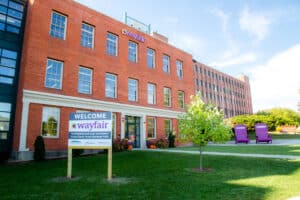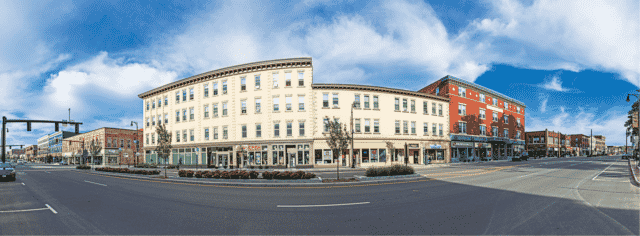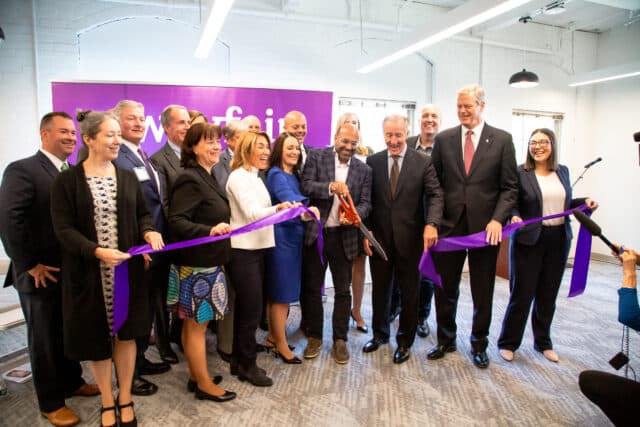
To continue its revival, many in Pittsfield say the city should focus on making many small steps while it awaits the next big deal. Photo courtesy of Wayfair | Emma Rothenberg-Ware
They’re still beaming in Pittsfield over Wayfair’s decision this past fall to locate its new customer service center – and 300 jobs – in the city’s Clock Tower Business Center on South Church Street. For a hardscrabble city that’s endured the loss of thousands of manufacturing jobs in recent decades, the furniture e-retailer’s move was a welcome economic shot in the arm.
But now, many in Pittsfield are also starting to ask: After Wayfair, what’s next for the Berkshire County city of 43,000?
Capitalize on Culture
Most agree the answer is: Stick to the recent game plan of winning a lot of small economic victories until, hopefully, the next big Wayfair-like jobs deal comes along, and then it’s back to the small economic victories again.
“It’s about a slow but steady transformation,” said Dave Carver, co-managing partner of CT Management Group LLC, owner of Clock Tower Business Center. “It’s almost like a formula. Keep up with the current businesses you have. Promote the ‘cultural economy.’ Try to attract new businesses.”
The formula indeed seems to be working, albeit slowly but steadily, for Pittsfield, one of the state’s dozens of officially designated “Gateway Cities.”
Even before online furniture vendor Wayfair opted to locate its new facility in the city – a move helped by millions in state tax credits and Wayfair co-founder and CEO Niraj Shah’s roots in Berkshire County – Pittsfield was already seeing economic improvements, largely as a result of its recent focus on promoting what Carver and others call the “cultural economy,” or what more accurately should be called the “cultural and tourism economies.”
The strategy: Leveraging and expanding upon the Berkshire’s already strong cultural and recreational assets, such as Tanglewood in Lennox and the region’s natural beauty, and make it work for the city.
Housing, Tourism Revive Downtown
In the early 2000s, Pittsfield scored major victories with the opening of the Colonial Theater, Barrington Stage Company and the Beacon Cinema.
Then came new downtown restaurants and shops, a streetscape redesign with historic lights and plantings, and more recently, new downtown market-rate apartments and condos in converted old buildings. Most of the improvements, though not all, are centered on or near North Street.
“In the 1990s, the downtown was bleak,” said Jesse Cook-Dubin, a local business attorney and president of Downtown Pittsfield Inc., an association of businesses and nonprofit groups. “There were boarded–up buildings, closed store fronts. It was awful.”
Today, the downtown area still has its share of vacant ground-level shops and banged–up buildings, with some estimating that 1 out of 4 storefronts remain empty. But it’s a huge improvement from Pittsfield’s recent past – and all signs point to continued improvements.

Drawing on its location in the heart of the Berkshires, Pittsfield has seen a downtown revival led by hospitality, housing and cultural businesses.
Pittsfield Mayor Linda Tyer points with pride to the recent opening of retail shops, such as Township Four (a floral store) and Omega 1 African Fashion, both on North Street and both recipients of recent city grants to help them launch.
Meanwhile, Tyer and others note the hundreds of new housing units, mostly in converted old buildings, that are now under construction or in the planning stages. One project includes the conversion of the former St. Mary’s Church complex into 29 market-rate housing units.
“I think there’s a demand for at least 250 more housing units,” said CT Management’s Carver, whose company is handling the St. Mary’s conversion project. “Two hundred and fifty units may not be a lot in a big city, but it’s a lot by Pittsfield standards.”
Tyer said the strong demand for downtown housing is one of the more encouraging aspects of Pittsfield’s ongoing recovery from the demise of its manufacturing economy in the late 20th century. Indeed, some in Pittsfield express hope that the region’s relatively inexpensive housing – with single-family homes gong for a median price of $177,000, compared to the statewide median of $400,000 – in itself might act as a draw for many people fed up with sky-high home prices in other parts of region.
Skill Gap Hampers Job Market
As successful as the “cultural and tourism” campaign has been in recent years, Pittsfield still needs non-hospitality jobs, city and business leaders acknowledge.
Tyler notes how the city’s so-called “Red Carpet Team,” made up of city and state officials, recently worked to draw not just Wayfair to Pittsfield but also a new six-engineer office belonging to Colorado’s Electro Magnetic Technologies. The city is committed to helping both existing and new companies that are thinking of expanding in Pittsfield, she said.

Gov. Charlie Baker, Lt. Gov. Karyn Polito, Wayfair CEO Niraj Shah and others celebrate the opening of
Wayfair’s Pittsfield call center in October 2019. Photo courtesy of Wayfair | Emma Rothenberg-Ware
But there’s one problem: Pittsfield, like other areas of the state, is suffering from a skilled labor shortage.
The area’s unemployment rate is now at a surprisingly low 3 percent, just a notch above the state’s unemployment rate of 2.9 percent, according to government data. Yet, many jobs advertised by area companies – including the city’s two largest employers, General Dynamics and Berkshire Health System – are going unfilled.
“It’s frustrating,” said Jonathan Butler, president and CEO of 1Berkshire, the region’s combined chamber of commerce and regional economic development organization. “Companies are hiring perpetually.”
Future Seen in Small Firms
Then there’s the relatively slow pace of redeveloping the former General Electric complex, now called the William Stanley Business Park, today overseen by the Pittsfield Economic Development Authority. The authority recently hit a home run with construction of the new 20,000-square-foot Berkshire Innovation Center, where officials hope to attract small, cutting-edge companies with its array of wet labs, clean rooms and offices.
But a full build-out of the William Stanley Business Park is still hampered by the need to install major infrastructure at the site, including new utility lines and stormwater systems.
Still, Tim Burke, CEO and managing partner at Mill Town Capital, said he’s cautiously optimistic about Pittsfield’s – and the business park’s – future development. Burke’s financial and real estate investment firm is planning to take space in the new Berkshire Innovation Center.
“The city has slowly realized that there’s not a new General Electric coming in,” he said of Pittsfield’s once–mighty but now–gone employer. “People are realizing it’s going to take a lot of smaller companies to move forward. It’s not going to be easy. But [the city] will continue to see improvements.”




 |
| 